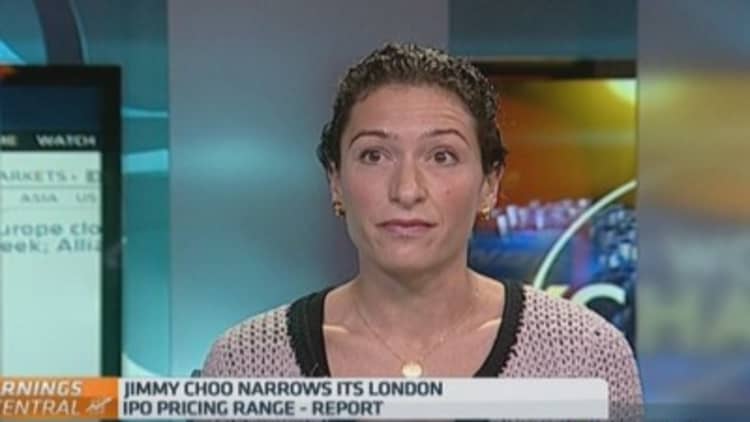Shares in British luxury handbag maker Mulberry were hammered on Tuesday after it issued another profit warning as it continues on a painful turnaround strategy.
The company, known for its £5,000-plus Bayswater and Lily bags, reported revenues for the six months to September 30 of £64.7 million ($103.2 million), down 17 percent compared with the same time last year. This prompted shares to fall as much as 23 percent.
Read MoreMulberry turnaround falters as luxury brands diverge
"Profit before tax for the full year to March 2015 is expected to be significantly below current expectations," Mulberry said in a statement following earlier profit warnings in the year.
'Painful' turnaround
Former CEO Bruno Guillon, who stepped down in March, took Mulberry away from its core customer base by raising prices, positioning the brand as an ultra-premium designer. But this has led to a big hit on the company's profitability.
Mulberry have now introduced the lower priced Tessie bag, which retails around £600, and a range with popular model Cara Delevigne near the £1,000 mark to attract the middle-market of buyers which the company has lost.
Analysts said the turnaround is likely to be "painful" and drawn out.
Read MoreLuxury stocks lose luster after LVMH disappointment
"When you take the prices above where they should be which is what happened, it is a painful, uncharted process to bring them back," Rahul Sharma, founder of Neev Capital told CNBC by phone.
Customers 'upset'
Mulberry said that the opening of its Paris flagship store in Spring 2015, will "mark the end of a period of accelerated investment in new stores" as it focuses on improving profits.
The U.K. designer did offer a glimmer of good news however. Online sales were up 1 percent to £6.6 million, accounting for 10 percent of group sales, while international retail sales were up a fifth to £7.5 million.

But in its pursuit of lower prices, Mulberry could isolate existing customers, analysts warned.
"Some of the customers of Mulberry in the past might feel a bit upset because they have the idea they have overspent for something that now has a lower value in the market," Mario Ortelli, senior luxury analyst at Sanford Bernstein, told CNBC by phone.
Burberry caution
Meanwhile U.K. designer Burberry also announced earnings on Tuesday, reporting revenue of £1.1 billion, up 14 percent underlying, with double-digit comparable sales growth in Asia Pacific and Americas. The company also said digital revenues "outperformed".
Read MoreBeauty: Luxury's ugly battleground
The strong pound had been hitting Burberry for some months, but a weaker sterling against some currencies such as the dollar has helped the company.
"If exchange rates remain at current levels, the full impact on reported retail/wholesale profit in FY 2015 will be material," the company said in a statement.
Despite the positive earnings, the fashion house struck a note of caution, suggesting the external environment was "becoming more difficult", sending shares in Burberry down over 5 percent in early morning trade.
"This is likely to refer to the weaker economic environment in Europe – where the company suffered the poorest performer in the first half," Helal Miah, investment research analyst at the Share Centre, said in a note.
Ebola, Hong Kong risks
Shares in luxury spectacles maker Luxottica, watchmaker Swatch Group, and French fashion house LVMH also fell as the sector continues to face headwinds.
Read MoreHow Draghi could give a boost to luxury stocks
Despite concerns over the slowdown in China subsiding, issues such as travel disruptions from Ebola as well as pro-democracy protests in Hong Kong, where the Chinese make up 70 percent of purchases, have been cited by analysts as risks for the sector.
"It is a sector a lot of people have loved for a long time and you are seeing slowing and people are sensitive to things that comes out to do with Chinese growth or sector peers coming out with slower numbers," Sharma said.


